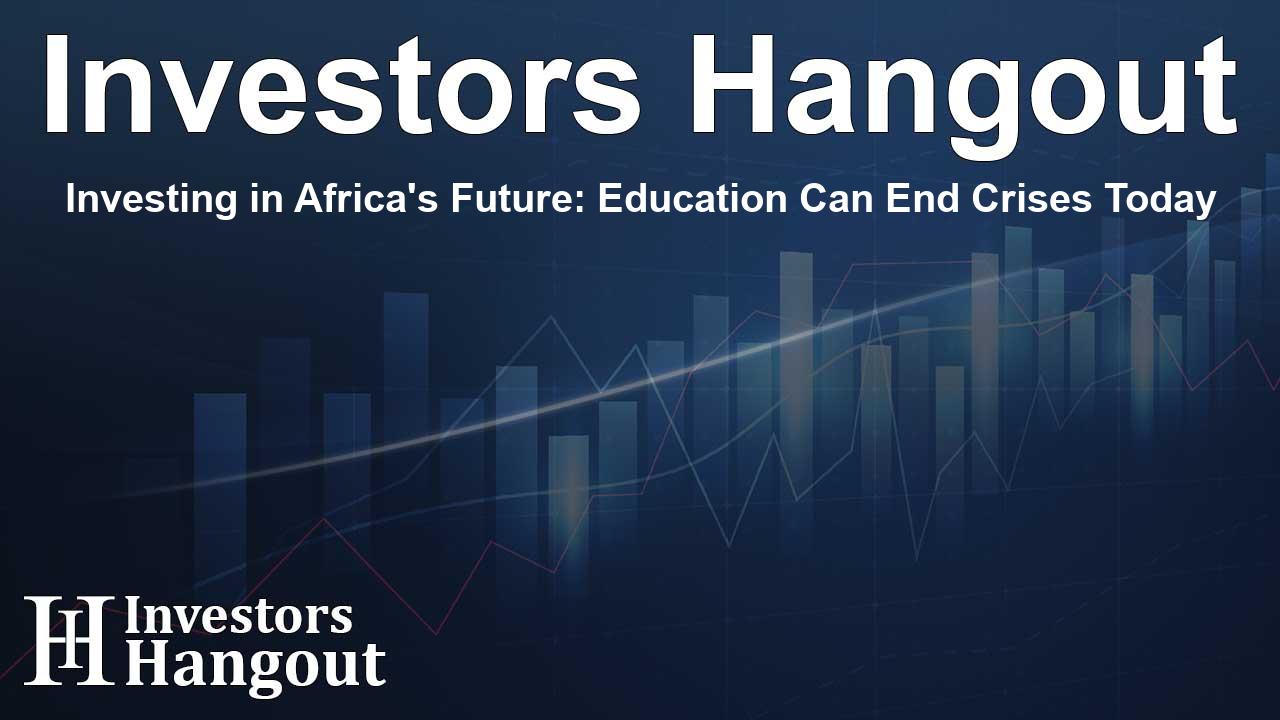Investing in Africa's Future: Education Can End Crises Today

A Call to Action: Transforming Africa Through Education
Education serves as a vital lifeline for the world’s most vulnerable children. By investing in their education today, we are promoting global security, economic growth, and stability critical for the 21st century.
The Crises Affecting Africa Today
The many challenges spread across Africa are both vast and troubling. From escalating violence in certain regions to war-torn areas disrupting daily lives, years of advancements face unprecedented threats. Bombings, killings, and other severe violations of human rights are currently prevalent, leading to a pressing need for immediate support.
The Power of Education in Crisis Response
Investing in the education of Africa's youth is the best approach to addressing these humanitarian crises. By empowering young generations through education, we can equip them to combat conflicts, eradicate poverty, and cultivate economic growth and stability. Without prioritizing education in our broader humanitarian strategies, we risk stunting all promising advancements.
The Urgent Need for Funding
Recent trends show that many traditional donor countries are diminishing their humanitarian support. Studies indicate a worrying drop in global aid for education. However, achieving stability and prosperity across Africa requires sustained funding and dedication to educational initiatives.
The Global Education Funding Gap
Educational goals outlined in the 2030 Agenda for Sustainable Development highlight a staggering funding gap of roughly $100 billion worldwide. Of this, approximately $70 billion resides within sub-Saharan Africa alone. Without addressing this urgent gap, Africa's resources and potential remain severely underutilized.
Child Education: A Grand Opportunity
The decline of educational engagement is a troubling trend, with four out of five children in Africa unable to read or comprehend basic texts by age ten. The cycle of conflict, climate change, and forced displacement perpetuates the lack of educational access. Investing in education is essential for any hope of attaining peace and advancing economic prosperity.
The Impact of Conflict on Education
The consequences of violence in the eastern Democratic Republic of the Congo (DRC) represent a heart-wrenching example. With millions forcibly displaced, children's rights and basic freedoms often hang in the balance, jeopardizing their futures and limiting their educational opportunities. Girls face additional vulnerabilities, such as the threat of sexual violence.
Addressing Ongoing Emergencies in Sudan
The humanitarian crisis in Sudan remains dire, with millions in desperate need of aid. Wars worsen educational frameworks, pushing countless children out of school and into uncertain futures. A staggering number of children are currently out of education due to ongoing conflicts, emphasizing the need for urgent reforms.
Education: The Solution to Sustainable Growth
As the global fund focused on education in emergencies, Education Cannot Wait is devoted to increasing humanitarian funding to ensure that every child has access to quality education. The systemic investments in education can significantly contribute to peacekeeping, economic stability, and overall societal development.
The Transformative Potential of Education
Africa is rapidly becoming a youth-oriented continent, with a remarkable percentage of the population under 25. This energetic demographic presents extensive opportunities if we can channel their skills towards educational pursuits. A clear link exists between education and economic growth; every extra year of schooling increases earnings.
Investing in Education: A Long-lasting Legacy
Investment in education offers the potential to break cycles of poverty and conflict. By reallocating funds from military expenditures toward education, healthcare, and community infrastructure initiatives, we can plant the seeds for a brighter, more stable future. This shift not only makes logical sense but represents a legacy of compassion and progress.
Frequently Asked Questions
How does education influence global security?
Education equips individuals with the skills and knowledge to drive economic growth and social stability, reducing the likelihood of conflicts.
What is the impact of the funding gap in education?
The significant funding gap jeopardizes educational access and quality, especially in sub-Saharan Africa, impeding development efforts across the continent.
Why is investing in Africa's youth crucial?
Africa's youth represents a considerable opportunity for innovation and economic advancement. By investing in their education, we lay the foundation for future progress.
What challenges do children face in conflict zones?
Children in conflict zones often experience disruptions to their education, increased risk of violence, and limited access to basic rights and resources.
How can the global community support education initiatives?
By advocating for increased humanitarian funding, participating in educational programs, and supporting local initiatives, the global community can help improve education access.
About The Author
Contact Dylan Bailey privately here. Or send an email with ATTN: Dylan Bailey as the subject to contact@investorshangout.com.
About Investors Hangout
Investors Hangout is a leading online stock forum for financial discussion and learning, offering a wide range of free tools and resources. It draws in traders of all levels, who exchange market knowledge, investigate trading tactics, and keep an eye on industry developments in real time. Featuring financial articles, stock message boards, quotes, charts, company profiles, and live news updates. Through cooperative learning and a wealth of informational resources, it helps users from novices creating their first portfolios to experts honing their techniques. Join Investors Hangout today: https://investorshangout.com/
The content of this article is based on factual, publicly available information and does not represent legal, financial, or investment advice. Investors Hangout does not offer financial advice, and the author is not a licensed financial advisor. Consult a qualified advisor before making any financial or investment decisions based on this article. This article should not be considered advice to purchase, sell, or hold any securities or other investments. If any of the material provided here is inaccurate, please contact us for corrections.
